In the IELTS Speaking Interview, the candidates have to deal with a lot of different vocabulary. The Speaking Section requires you to hear and say a lot of “function” words that people use when they are asking for information or giving information. Knowing a lot of vocabulary will help the candidates to clear the IELTS exam easily. In the below mention blog, the candidates will get to know about useful vocabulary for IELTS speaking, how to improve vocabulary for IELTS and tips for IELTS speaking vocabulary.
This Blog Includes:
Vocabulary for IELTS Speaking
The students who want to go abroad for their higher education or job have to appear for the IELTS exam. The IELTS exam consists of the speaking test which consists of the vocabulary. Below mentioned are the vocabulary for the IELTS Speaking test:
| S.No. | IELTS Vocabulary Words | Meaning |
| 1 | Ludicrous | Unreasonable, or out of place |
| 2 | Proponent | A person who advocates for something |
| 3 | Indulge | To enjoy the pleasure of something |
| 4 | Pinnacle | The most successful point |
| 5 | Invigorating | Making one feel strong, healthy, and full of energy. |
| 6 | Mere | Used to emphasize how insignificant someone or something is |
| 7 | Exacerbate | To make something worse |
| 8 | Mitigate | Make less severe, less unpleasant |
| 9 | Unsurmountable | Impossible to solve |
| 10 | An uphill struggle | unhappy and disappointed/dissatisfied |
| 11 | Apprehensive | worried, nervous (about a bad result) |
| 12 | Disgruntled | unhappy and disappointed / dissatisfied |
| 13 | Bewildered | confused |
| 14 | To do my utmost | To try my best |
| 15 | Inept | Not good at your job, showing a lack of skill |
| 16 | Impeccable | Perfect, without fault |
Also Read: Vocabulary for IELTS
How to Improve Vocabulary for IELTS Speaking?
IELTS Speaking Vocabulary is very important in two ways i.e. The range of vocabulary and The accuracy of vocabulary. The best ways to improve the Vocabulary for IELTS Speaking are mentioned below:
- Make notes of every new word and phrases
- Focus on collocations of new words
- Study a different range of topics
- Use different methods to learn new words
- Regularly practice new words.
Must Read: IELTS Vocabulary
IELTS Speaking Vocabulary Tips
The students who are preparing for the IELTS exam and will be appearing for the exam in a few days must focus on IELTS Speaking Vocabulary which is an important part of the IELTS exam. Below mentioned are a few tips regarding IELTS Speaking Test which are as follows:
- Develop a skill to talk on different topics.
- Don’t hesitate to clear your doubts
- Don’t memorize your answers before the exams.
- Practice from sample questions.
- Don’t get panic if you make mistakes
- Practise speaking about different topics with native and non-native speakers.
- When using examples in the responses, try to avoid hypothetical situations.
- Write out your sample answers and try and upgrade them
- Write useful phrases for the exam
- Practice fluency and accuracy separately.
- Explain and develop your answers
- Don’t speak too fast. Speak slowly and clearly.
FAQs
Yes, getting an IELTS band score of 9 in the actual exam is very much possible. This is possible if you have met the expectations of the IELTS examiner and showcased the qualities of a competent user of the English language.
To improve vocabulary for IELTS Speaking test the candidate can get an idiom dictionary and learn a few a day, Read extensively from newspapers to magazines, Watch the evening news every night, Read across various disciplines and topics (from tech to family & climate change), Learn synonyms for commonly used words.
Vocabulary refers to the words we must understand to communicate effectively. Educators often consider four types of vocabulary: listening, speaking, reading, and writing.
Need help preparing for IELTS? Check out the best IELTS preparation courses in the market offered in a live training environment by trusted educators in a live training environment. If you want help to study abroad, call 1800-572-130.
 One app for all your study abroad needs
One app for all your study abroad needs
















 45,000+ students realised their study abroad dream with us. Take the first step today.
45,000+ students realised their study abroad dream with us. Take the first step today.